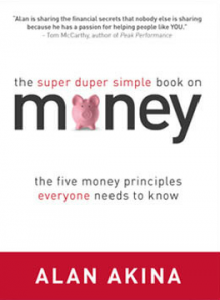 When I finished reading Alan Akina’s “The Super Duper Simple Book On Money” (which only took about a half an hour to read), the first thought I had was “wow, that is an aptly name book”. When Alan says it is a simple book, he tells the truth. The thing about it is, it’s not just that it’s an easy book to read; the concepts that he presents are very simple. And when you’re trying to understand money, sometime simple is best.
When I finished reading Alan Akina’s “The Super Duper Simple Book On Money” (which only took about a half an hour to read), the first thought I had was “wow, that is an aptly name book”. When Alan says it is a simple book, he tells the truth. The thing about it is, it’s not just that it’s an easy book to read; the concepts that he presents are very simple. And when you’re trying to understand money, sometime simple is best.
Alan begins the book by divulging some elements of his childhood. He grew up poor, had divorced parents, often moving from home to home. He gives a very touching story about his grandmother and her influence on his life (what I enjoyed about this is how is really highlights the profound impact just one person can have). He talks about his struggles with money and how he overcame them, and how those struggles inspired him to teach others what he learned. For someone like me, who prefers the advice of real people who have been there to the advice of experts who never have, it was nice to have a context in which to set his ideas.
On to Alan’s principles. The book focuses on 5 basic concepts revolving around money:
- Money in (income)
- Money out (bills)
- Money we owe (debt)
- Money we grow (investments)
- Money we share (charitable giving)
It really doesn’t get easier than that. What I appreciate about these concepts is that it breaks down money management into easy to explain ideas. As a parent trying to teach my child about money, these 5 principles are simple to explain, even to a 5 year old. They make sense, are logical, and are presented in a progression that makes you have that “aha” moment about your finances. You finish the book not confused about how to manage your money; rather you finish the book thinking “I can do this”. It’s a nice feeling.
But I think my favorite part of the book was how interactive it is. I read the e-book version of the book, and to break it up, there are links to downloadable worksheets, YouTube videos of Alan presenting his ideas on a Hawaiian affiliate of Fox News (where he has been presenting financial news for years), and sidebar stories of people he’s helped with his advice (I’m a sucker for success stories). Now that I have the book saved on my iPad, I can go back and reread it or download the worksheets, especially when I need to get back to the basics with my finances.
This, like Wealth Watchers, is a book I had when I first started learning about money. And like Wealth Watchers, it’s not so much a plan to get out of debt as it is a book that gives a broad overview of financial management. That financial management includes emphasizing the importance of avoiding or getting out of debt.
A word of caution about this book. For those who already have a fairly strong understanding of managing their day to day finances, this book will be too simple. In fact, it may seem oversimplified and it’s probably not the best choice to add to the personal finance section of your library. But if you know someone who did not receive a proper financial education or is struggling with understanding the basics of financial management, this is a great place to start.
Although I received a free copy of this book, the opinions are entirely mine and I was not compensated in any other way.


I agree. I read it too and it wasn’t anything I don’t think most PF bloggers already know, but worthwhile for a lot of other people I’m sure.
Budget & the Beach recently posted…Be You